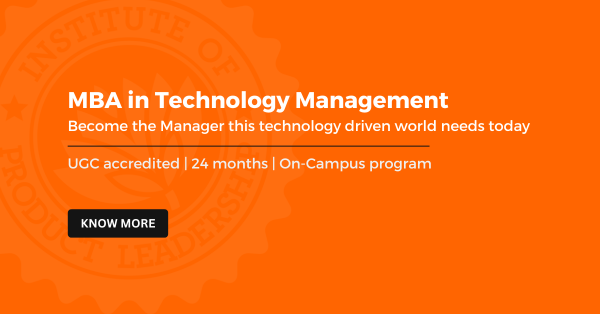Future of MBA in Technology: How AI, Cloud, and Cybersecurity Are Changing the Role
- blogs
- 5 min read
By Srishti Sharma– Product Marketer
In 2023, a global consultancy revealed that nearly 70% of CEOs believed their organizations would struggle to survive the next decade without embracing artificial intelligence, cloud-first strategies, and stronger cybersecurity. At the same time, business schools reported a sharp rise in enrollment for programs like the MBA in Information Technology, signalling that future leaders are preparing themselves for exactly this reality. The workplace is shifting, and so is the degree to which it trains managers to bridge business goals with fast-changing technology.
Key Takeaways:
- MBA in Information Technology has evolved from IT management to enterprise leadership in digital transformation.
- AI, cloud, and cybersecurity are the three pillars reshaping business education.
- The MBA in Technology Management syllabus emphasizes data, automation, governance, and ethics.
- Online MBA in Information Technology programs provide flexibility and real-world project experience.
- Future managers will succeed by blending strategy, technical fluency, and change leadership.
The Evolution of MBA in Information Technology
The MBA in Information Technology started as a specialized track for professionals who wanted to manage IT systems, ERP implementations, or digital transformation projects. Over the years, the scope has expanded dramatically. Today’s curriculum emphasizes not only managing technology but also understanding how data, AI, and security strategies influence competitive advantage.
Programs such as MBA Information Technology Management are no longer niche. They are central to how companies hire and train leaders. Businesses now demand graduates who can decode technical frameworks while aligning them with finance, marketing, and operations.
The rise of online MBA in Information Technology and online MBA Information Technology Management programs further reflects this shift. These digital formats make it possible for working professionals to upskill without leaving their roles, providing flexibility in an era where tech cycles move faster than ever.
Artificial Intelligence as a Core Driver
AI is no longer an experimental tool in the corner office. It is rewriting how organizations operate, from predictive analytics in retail to generative models that automate product design. For managers pursuing an MBA in Information Technology, AI is not an optional elective it is part of the foundation.
Courses in machine learning, AI strategy, and automation are now embedded into the MBA in Technology Management syllabus. Graduates are expected to interpret algorithmic outputs, assess ethical risks, and make decisions about where automation should replace human labor and where it should augment it.
The future manager must not only understand the technical side of AI but also anticipate its organizational consequences. This includes handling workforce reskilling, managing customer expectations of personalization, and ensuring that AI projects align with company vision.
Cloud as the New Infrastructure
The shift to cloud computing has redefined scale, cost, and flexibility for businesses. What once required massive investments in physical servers can now be managed with a subscription. For students pursuing an MBA in Information Technology, this means developing an understanding of cloud economics and governance.
Cloud is not only about IT savings. It is about enabling business agility. Supply chains can adjust instantly, customer data can be accessed globally, and teams can collaborate in real time. Leaders with an MBA Information Technology Management degree are increasingly tasked with choosing between multi-cloud, hybrid cloud, and private cloud strategies decisions that impact security, efficiency, and compliance across global markets.
The MBA in Technology Management syllabus now emphasizes cloud-based case studies, vendor negotiations, and architecture decisions that connect business needs with technological frameworks.
Cybersecurity as a Strategic Imperative
While AI and cloud offer immense opportunities, they also expand the attack surface for cyber threats. Ransomware targeting healthcare systems, data breaches in financial institutions, and phishing campaigns against employees highlight how fragile digital operations can be.
This makes cybersecurity not only a technical matter but a boardroom discussion. An MBA in Information Technology equips leaders to interpret risk assessments, understand compliance frameworks, and design incident response strategies. Future managers are expected to translate highly technical vulnerabilities into business risks that shareholders and regulators can understand.
Cybersecurity modules in MBA Information Technology Management programs now cover governance, digital ethics, and resilience planning. Graduates who can navigate this balance will become indispensable in industries where trust and compliance determine survival.
Redefining Skills for the Future
The role of an MBA graduate is no longer limited to managing budgets and timelines. The rise of AI, cloud, and cybersecurity demands an expanded skillset:
- Data literacy – Comfort with analytics, dashboards, and predictive modelling.
- Tech fluency – Understanding of APIs, automation workflows, and digital platforms.
- Risk management – Ability to integrate compliance and cybersecurity into strategic planning.
- Change leadership – Skills to guide organizations through digital adoption and cultural shifts.
- Cross-functional communication – Translating technical jargon into language that finance, HR, and marketing leaders can act on.
This is why the MBA in Technology Management syllabus is becoming more interdisciplinary, blending traditional business modules with hands-on technical labs and simulations.
Opportunities in Online MBA Programs
The rise of the online MBA in Information Technology and online MBA Information Technology Management has unlocked global access to these programs. Professionals in banking, retail, consulting, or healthcare can now learn from international faculty and peers without relocating.
These programs often emphasize applied projects cloud migration plans, AI implementation roadmaps, or cybersecurity policy design. The online format mirrors the reality of today’s workplace, where hybrid collaboration and distributed teams are the norm. Graduates emerge not only with theoretical knowledge but with practice in working across digital environments.
The Future Role of Technology MBAs
Looking ahead, the MBA in Information Technology will be less about managing IT departments and more about steering entire enterprises through technological transformation. Leaders will be measured by how effectively they:
- Integrate AI into business processes while managing risks.
- Leverage cloud for scalability and cost efficiency.
- Protect organizational assets through proactive cybersecurity.
- Bridge business strategy with evolving technologies in a global, digital marketplace.
Employers are already seeking graduates who can wear both hats: strategist and technologist. This is pushing the demand for professionals trained through both traditional MBA Information Technology Management and modern online MBA programs.
The degree is no longer a technical specialization it is a leadership pathway.
Technology is not standing still. AI models are advancing every quarter, cloud providers are expanding capabilities, and cyber threats are becoming more complex. An MBA in Information Technology is designed for those who want to lead in this environment, where business goals and technology are inseparable.
Whether pursued on campus or through an online MBA in Information Technology, the program builds leaders who can decode complexity, mitigate risks, and seize opportunities. The MBA in Technology Management syllabus reflects this urgency, equipping graduates with both technical literacy and strategic vision.
For professionals evaluating their future, the message is clear: the next decade belongs to those who understand both the language of business and the architecture of technology. An MBA Information Technology Management degree is not just an academic credential it is preparation for leadership in the age of AI, cloud, and cybersecurity.






